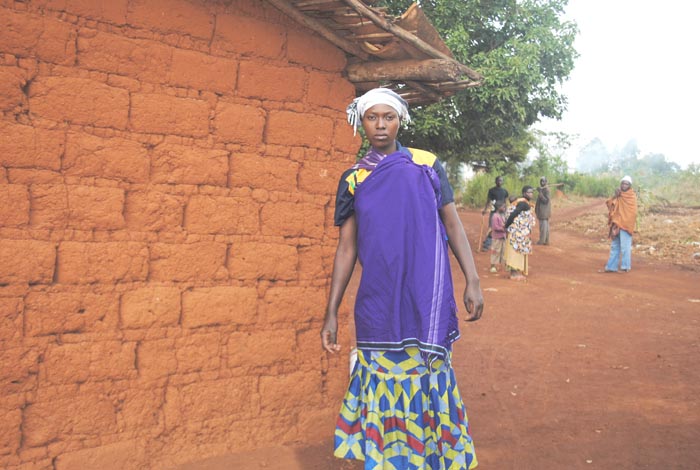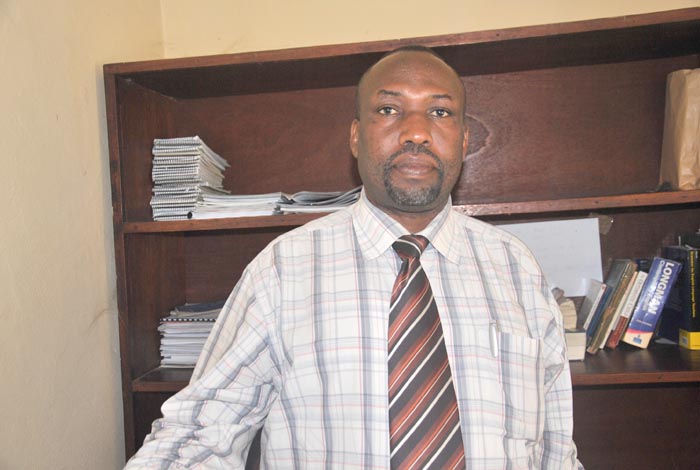The fact of burning and wrecking Burundian refugees and citizens’ houses chased from Tanzania shows that Tanzanian authorities do not want them to go back to their country. However, some Burundians hope they will join some members of their families and take back their few properties left there – By Lorraine Josiane Manishatse

Jacqueline Ndorimana, a Burundian woman repatriated from Tanzania, met at Kinazi Site. “They have obliged us to leave Tanzania first, before coming back there with genuine identity documents, but for me, it will be quite impossible to live there whereas they have destroyed our houses,”©Iwacu
“Tanzanian police continue to chase Burundians and Rwandans living in Tanzania, I have just arrived here after spending the whole night walking. My house has been wrecked after they have plundered all my goods. Along the street, I have seen other houses belonging to Burundians and Rwandans being burned and wrecked” states Estella Nimbona, met at Kinazi Site in Muyinga Province. She has come to Kinazi site, because that area has been prepared to shelter Burundians forced to leave Tanzania. For her, going back there, will be very difficult; they used to pay 1OO $ to get citizenship, but now they don’t accept it, perhaps they will ask much more before letting them go back to join their families stayed there. She also indicates that Tanzanian people have burned and destroyed their houses.
“I don’t want to return to Tanzania once again, they have mistreated us enough, and I want to join my native province Kirundo. Unfortunately, I don’t know where my husband and two children are” she says while shedding tears. The idea is contrary to Jacqueline Ndorimana’s; for her, she must join her Tanzanian husband and children though she is pessimistic about its feasibility. “They have obliged us to leave Tanzania first, before coming back there with genuine identity documents, but for me, it will be quite impossible to live there whereas they have destroyed our houses,” she states in a hopeless way. But Rashidi Nyandwi would like to go back to Tanzania at any cost, because he still believes he is a Tanzanian citizen. “Even if they have burned my house, I am obliged to go back to Tanzania, it is my country of birth, I am not either a Burundian or a Rwandan, because I was born there and don’t know any person in Burundi even my parents’ origin,” he highlights.
They need Burundi Government’s support
Nyandwi asks the Burundian government to help them get necessary documents to be accepted in Tanzania. “Others have been brought to their homeland, but I am still in the site because I don’t know where to go,” he states. It is worthy to point out that Rashidi doesn’t speak Kirundi and is classified among people without reference in their origin countries. The view is shared by Jacqueline Ndorimana who states that Burundi Government should support them by pleading for them to Tanzanian authorities; so that they can join again their families remained in Tanzania.
“It is very hard for mums to live separately with their children and husbands,” she says angrily.
Tanzanian authorities have violated the convention
According to the Governor of Muyinga, Ildephonse Ntawunkunda, separation of families is a prohibited act. On 1 September, 2013, governors of Muyinga, Cankuzo, Ruyigi, Karuzi and Rutana made a meeting with Ngoro area authorities. During that meeting they decided to stop chasing members of married families of Tanzanians and Burundians. “Unfortunately, they didn’t respected our convention, men and women continue to come leaving their families in Tanzania,” he regrets. Ntawunkunda indicates that the Administrators of Muyinga Communes will recently conduct a census of all children born from one Tanzanian parent, and we will bring them to Tanzanian authorities. He adds that, the fact of destroying houses belonging to Burundians and Rwandans shows that they don’t want them to go back. He calls upon all Burundians to love their country, be proud of living in their mother country, and contribute in its development; there is no use fleeing your country any time there is a problem unless you are threatened with death.
Burundians are victims of a conflict between Rwanda and Tanzania

Pascal Niyonizigiye, an Expert in International Relation and Lecturer at the University of Burundi: “Tanzania has developed a sentiment of rejection and hostility towards refugees, as they want to live alone and solve their own problems.”©Iwacu
According to Pascal Niyonizigiye, an Expert in International Relations and Lecturer at the University of Burundi, officially speaking, there isn’t any problem between Burundi and Tanzania. The fact of burning houses belonging to Burundians is the result of a conflict between Tanzanian and Rwandan authorities, and Burundians are only the victims of the situation. Another trend in Tanzania is that the country is now fed up with receiving Burundian and Rwandan refugees. The country wants them to go back to their homelands forever. For Niyonizigiye, Tanzania has been characterized by three periods. First, from 1960 to 1970, it was a period of sympathy to refugees, called “freedom fighters”, secondly, from 1970 to 1980, this was a period of lassitude, where it was hard for the government to support refugees and should help them go away, and the third one which is a recent situation has started since 1990, where Tanzania has developed a sentiment of rejection and hostility towards refugees, as they want to live alone and solve their own problems. In conclusion, he highlights that in EAC, the position of Tanzania is not clear about lands legislation, and it seems they don’t agree with it lest they become invaded by other EAC countries.



















 IWACU Open Data
IWACU Open Data

